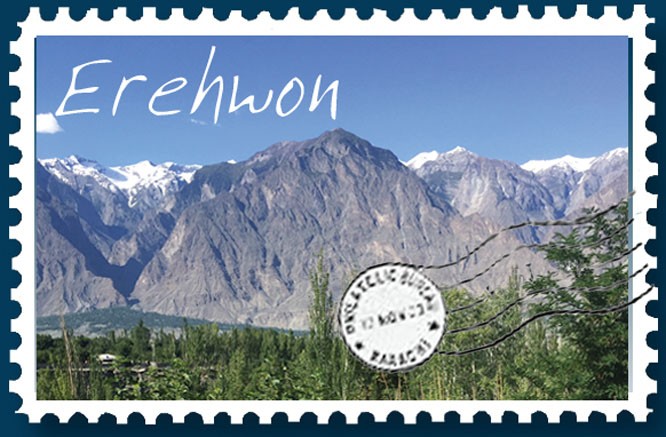
A new series on how one of the simplest ways to act for climate change is to be in the natural world -- to be inspired, connected and informed

It is high summer in the Karakorams, our black mountains. Like new teeth of human children, their tips too, are still jagged despite their magnificent size. These new mountains have not yet been rubbed smooth by the wind and rain. Instead, their crenellated peaks poke into the clouds, parts of them tumbling down in great rock falls and snow avalanches at unpredictable times.
I look across the stone terraces of my garden in the Gilgit town. Late summer snow cloaks Sakwar Peaks above the black masses of rock behind the town. Yet in early morning and evening when the light softly falls on the mighty shoulders of the peaks, I see tremendous forests of conifers.
These are not naked mountains. They hide their forest cover like a soft smudging of green moss. They are so vertical that the human eye cannot fathom the moss-like green to be what it is: tall mature forests. These stands of trees are communities of junipers, oaks and pines and one can only imagine the sloping stands of grassy knolls and pungent perfumes that must waft up on those magnificent shoulders.
Among these trees and grasslands roam wild markhors, the screw-horn goat that is Pakistan’s national animal. Tallest of the wild goat family, markhors are remote denizens of the Karakoram, with a few small strongholds still thought to have hardly ever been approached by humans. In Gilgit-Baltistan, many pockets of markhor populations now roam in places that are officially declared community-protected areas. In these areas, local villagers have turned from hunting markhor for meat to protecting these herds for controlled hunting programmes. My daughters have been to valleys where at the occasional festivity, markhor meat is still served as the high culinary offering of the Karakoram wilderness. They say that it is the finest of meats, lean, dark and densely compact.
Sometimes when the light is soft, I look carefully for movement but never see any because of the scale of the sheer rock walls. It reminds me of how very small I am.
I am surrounded by the sound of falling water as it gushes from its mother glacier on the south side of Rakaposhi mountain. Flowing down the boulder-strewn nullah of my village, in high summer the sound surrounds one like a soothing, safe-keeping feather quilt. I listen to it as I fall asleep at night, waking to it also but now accompanied by the sound of the song thrush calling at earliest pre-dawn.
Today, there has been some bad news. My Chowkidar (gatekeeper), Raazi’s cousin, has been buried under a snow avalanche while mountaineering beyond Iskhoman. He was a high-altitude porter from the Shimshal valley. His body cannot be traced. Five men from his village will climb to follow his tracks, find his body then help its airlift back for his last rites and burial near his Shimshal valley home.
Mai and Nudrat, our chowkidar’s daughters explain in their hushed little girl’s voices: "many of our uncles have died while climbing". At home, they often listen to a new Wakhi song that celebrates the valour and strength of these uncles who have died but are not to be forgotten because they are icons of the Shimshaliness. They stand for the hardiness, adventure and endurance that Mai and Nudrat have been born into as girls from Shimshal. It is a sad but catchy tune and their little twin sisters dance and sing about these relatives as the family sits around with bittersweetness in the air.
But this time, two women from their village were also members of the climbing expedition, they too were injured in the same avalanche but safely airlifted. Raazi was away all day yesterday attending to these two women at the hospital before their close relatives could reach Gilgit and tend to them. "They will live, nothing is broken; just bruises and bumps," he tells me.
Also read: A tale of hornbills
Our dramatic, perilous and yet so compelling Karakorams. We are at once awed with their majesty and made so small by their size. The tenderness of the singing thrush’s mid-day calls is a whistling of carefree whimsy. The gushing water surrounds me, I wait for the evening when the sunlight becomes soft so as to walk on the paths with views of smudged green which are actually mighty conifer forests.
Above the forests, somewhere touching the clouds, I imagine a solitary snow leopard roaming its eternal territory. It doesn’t seem so far away, almost within reach is this perfect purity.